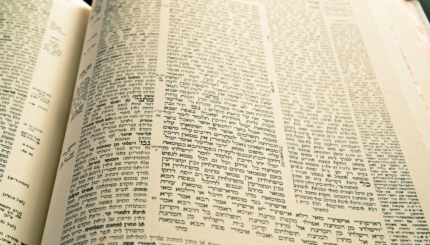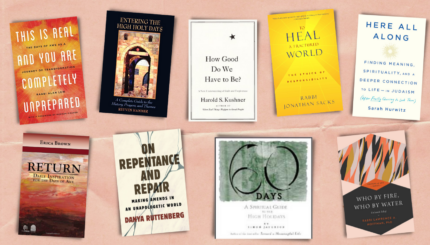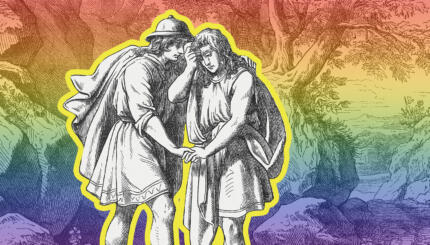Excerpted with permission from A Time for Every Purpose Under Heaven (Farrar, Straus and Giroux, LLC).
The night arrived–not exactly as imagined, but powerful nonetheless. Rain clouds and thick trees hid the full moon. An early closing of the Palisades Interstate Park forced us to move from the flowing Hudson to a trickling brook. The arrival of police cars–keeping the neighborhood safe–gave this most natural of ceremonies a hint of the forbidden and eerie.
More than a dozen of us, holding candles to share with the moon the task of illuminating the dark, gathered in a circle with Morissa and the other young girls in the center. We sang the song "Love Is the Only Answer" from a David Zeller album, which ends with the words "watch our circle grow."
Sharing Woman-Experience
As I gazed at the faces of loved friends in the circle, I realized that a world of possibilities of living as a woman were represented in that circle: married women with children; unmarried women with children; married women without children; unmarried women with lovers either male or female; unmarried women without lovers. The straight-and-narrow slice of the world that was offered to me as truth-and-all when I began to menstruate, has, like the full moon, swelled with possibilities for Morissa and the young women of her generation. But do we dare show it to our children?

Help us keep Jewish knowledge accessible to millions of people around the world.
Your donation to My Jewish Learning fuels endless journeys of Jewish discovery. With your help, My Jewish Learning can continue to provide nonstop opportunities for learning, connection and growth.
I began the ceremony by supplying some background:
"We bring the ordinary into holy consciousness through ceremony/service/celebration. By moving a life-moment from its private enclosure, often clouded with secrecy, fear, shame, and curse, we confront those feelings that have lived for generations within us, and replace them with pride in the miraculous workings of our body.
"For many of us who have grown up with ambivalent messages from our mothers and grandmothers, this affirming message does not come so easily to pass on to our daughters. We don’t really know where or why we hide this life passage–which many cultures don’t hide–but we have internalized the need for secrecy.
"We have finally come of age as women to ask: What have we lost in our failure to take pride in our changing bodies? What does that say about our feelings for ourselves, our daughters, our community of sisters? It is time to use ceremony to purge us from feelings of shame, disconnectedness, ordinariness.
"This ceremony of menstruation calls for a moonlit night: the moon, like a woman’s cycle, waxing and waning; the full moon like an egg bursting forth from the ovary fully ripe. The full moon, coming right in the middle of Morissa’s cycle, gives a feeling of congruence, of being on target, of being in touch with the Holy One of Being. How absolutely right it feels tonight, to celebrate Morissa’s fullness with that of the moon and our "weave of women" (as Esther Broner’s novel has named it)! The very ceremony is a microcosm of what it means to be a woman, to speak a special intuitive language with other women and the universe."
As Jews, we symbolically give our children the as their inheritance/path of life upon their bat/bar mitzvah. So, for menarche, I called upon the women in the circle to hand down to Morissa a teaching that had come from their own or other people’s woman-experience.
Some spoke to Morissa from themselves; others read from books or poems or stories. People spoke about friendship; about pregnancy and childbirth; about belonging to community; about learning that women friends were not to be discarded when men came into their lives. I said–with some trepidation–that while she was still too young for my message, I welcomed her to a time when her mind and heart would catch up with her body, and she would be able to experience, as I have, the sheer pleasure of living in a woman’s body.
Friends gave Morissa all kinds of books, as widely divergent as the lifestyles of the women present, [including]… several blank books waiting to be written by Morissa herself. Though many of the books were beyond Morissa’s understanding or interest right then, they stood on her shelves as a legacy to explore when she would be ready, like treasure chests in the attic.
So, too, many of the words said or read to her were more than she could fully take in that night, but Morissa did know that she had received a welcoming full of love and hope.
Ceremonies Recognize Transformation
From our Native American sisters we had learned of a menarche ceremony–including men as well as women–in which the community sits in watch through the night over the rising cornbread. The night before Morissa’s ceremony, she and I sat up through most of the night, kneading, talking, and watching the rising [braided Sabbath bread]. It was her first time to take charge (not merely to assist me) in the baking of challah. We brought her baked loaves to her ceremony, inviting "women to savor the taste but to save a small piece for the Tashlikh [Rosh Hashanah custom in which bread crumbs representing sins are tossed into a flowing stream] to follow.
Along with the moon as symbol, the ceremony called for water: water reminding us of the birth waters that bring forth new selves; and of Miryam, who sweetened the water in the desert so that it was fit to drink. Had the night been warmer, another month toward summer’s heat, I would have chosen a site where we could have used water for a (ritual bath)–not from the tradition that calls for cleansing what is impure, but rather from the place of rebirthing our consciousness.
We often take for granted that extraordinary blessing which is our naturally functioning bodies. By immersing ourselves fully into cold water, we are startled to awareness that what is with us all the time is itself a miracle. By purifying our vision, we can see the (w)holiness that is all-present. In lieu of a mikveh on this cool May night, we used our crumbs of challah for a Tashlikh ceremony.
A Different Kind of Tashlikh
Tashlikh… does not have to be understood as simply casting off those deadly parts of ourselves we want to be rid of, but rather as a turning around to see a life-giving aspect of those same parts. At this moment marking the transition between childhood and adulthood, I invited everyone in the circle to look into themselves at those aspects that were still childish and immature. Once we were able to identify those parts of ourselves, we might symbolically cast them upon the crumbs of challah into the brook so that the waters might turn them around and allow us to retain our wonder-full childlikeness in a more disciplined, mature fashion.
As we searched within ourselves and lined the banks of the brook, turning the child in ourselves from an out-of-control state into a fine-tuned one, we sang the song "Return Again" (from Shlomo Carlebach via David Zeller’s album), which ends with the words "Return to where you are born and reborn again."
We regathered into our inner and outer circles, making a berakhah [blessing] over wine. That blessing, like the one for challah, was recited in traditional as well as feminized Hebrew and translated into "midrashic" [interpretive] English.
Berukha at Shekhinah, Makor ha’hayim, boreyt p’ri hagafen.
Blessed are You, Shechinah, Source/Sorceress of all life, who has made the fruits of the vine sweet to our taste, in the familiar color of our life-giving blood.
Then, in the fullness of the night, we recited two blessings that are normally part of the morning, not the evening, service:
Barukh ata YHWH eloheynu ruah ha-olam she-asani b’tzelem Elohim.
Blessed are You, Holy One of Being, Mother-and-Father of us all, who has made me in Your image, like Adam from the adamah (ground) upon creation, with the feminine and masculine sides still intertwined.
Berukha at YHWH eloheynu ruah ha-olam she–astani isha.
Blessed are You, Holy one of Being, Mother-and-Father of us all, who has created me predominantly and joyously female.
And then, as we invited Morissa to move from the inner circle where she stood with four other young girls, into our outer circle of women, we sang:
Barukh ata YHWH eloheynu ruah ha-olam shehecheyatnu v ‘kly’matnu v’higi-atnu lazman hazeh.
Blessed are You, Holy One of Being, Parent of us all, Who has brought us with great joy to this moment of change in Morissa’s life and in the lives of all of us joined in celebration.
In closing we sang again the words to the Zeller song that ends, "watch our circle grow."
As we come to love ourselves, including the wondrous workings of our bodies, the love flows naturally to our daughters and sons, our friends and lovers, our mothers and fathers, our community, and those whom we still consider strangers.
Keyn y ‘hi ratzon!–May it be so!
Excerpted from "Embodying God" from A Time for Every Purpose Under Heaven by Arthur Ocean Waskow and Phyllis Ocean Berman.
Copyright (c) 2002 by Arthur Ocean Waskow and Phyllis Ocean Berman. Used by permission of Farrar, Straus and Giroux, LLC. All rights reserved.
CAUTION: Users are warned that this work is protected under copyright laws and downloading is strictly prohibited. The right to reproduce or transfer the work via any medium must be secured with Farrar, Straus and Giroux, LLC.


